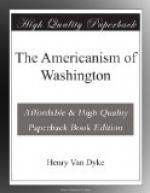Among these men whose union in purpose and action made the strength and stability of the republic, Washington was first, not only in the largeness of his nature, the loftiness of his desires, and the vigor of his will, but also in that representative quality which makes a man able to stand as the true hero of a great people. He had an instinctive power to divine, amid the confusions of rival interests and the cries of factional strife, the new aims and hopes, the vital needs and aspirations, which were the common inspiration of the people’s cause and the creative forces of the American nation. The power to understand this, the faith to believe in it, and the unselfish courage to live for it, was the central factor of Washington’s life, the heart and fountain of his splendid Americanism.
It was denied during his lifetime, for a little while, by those who envied his greatness, resented his leadership, and sought to shake him from his lofty place. But he stood serene and imperturbable, while that denial, like many another blast of evil-scented wind, passed into nothingness, even before the disappearance of the party strife out of whose fermentation it had arisen. By the unanimous judgment of his countrymen for two generations after his death he was hailed as Pater Patriae; and the age which conferred that title was too ingenuous to suppose that the father could be of a different race from his own offspring.
But the modern doubt is more subtle, more curious, more refined in its methods. It does not spring, as the old denial did, from a partisan hatred, which would seek to discredit Washington by an accusation of undue partiality for England, and thus to break his hold upon the love of the people. It arises, rather, like a creeping exhalation, from a modern theory of what true Americanism really is: a theory which goes back, indeed, for its inspiration to Dr. Johnson’s somewhat crudely expressed opinion that “the Americans were a race whom no other mortals could wish to resemble”; but which, in its later form, takes counsel with those British connoisseurs who demand of their typical American not depravity of morals but deprivation of manners, not vice of heart but vulgarity of speech, not badness but bumptiousness, and at least enough of eccentricity to make him amusing to cultivated people.
Not a few of our native professors and critics are inclined to accept some features of this view, perhaps in mere reaction from the unamusing character of their own existence. They are not quite ready to subscribe to Mr. Kipling’s statement that the real American is
“Unkempt, disreputable, vast,”
I remember reading somewhere that Tennyson had an idea that Longfellow, when he met him, would put his feet upon the table. And it is precisely because Longfellow kept his feet in their proper place, in society as well as in verse, that some critics, nowadays, would have us believe that he was not a truly American poet.




